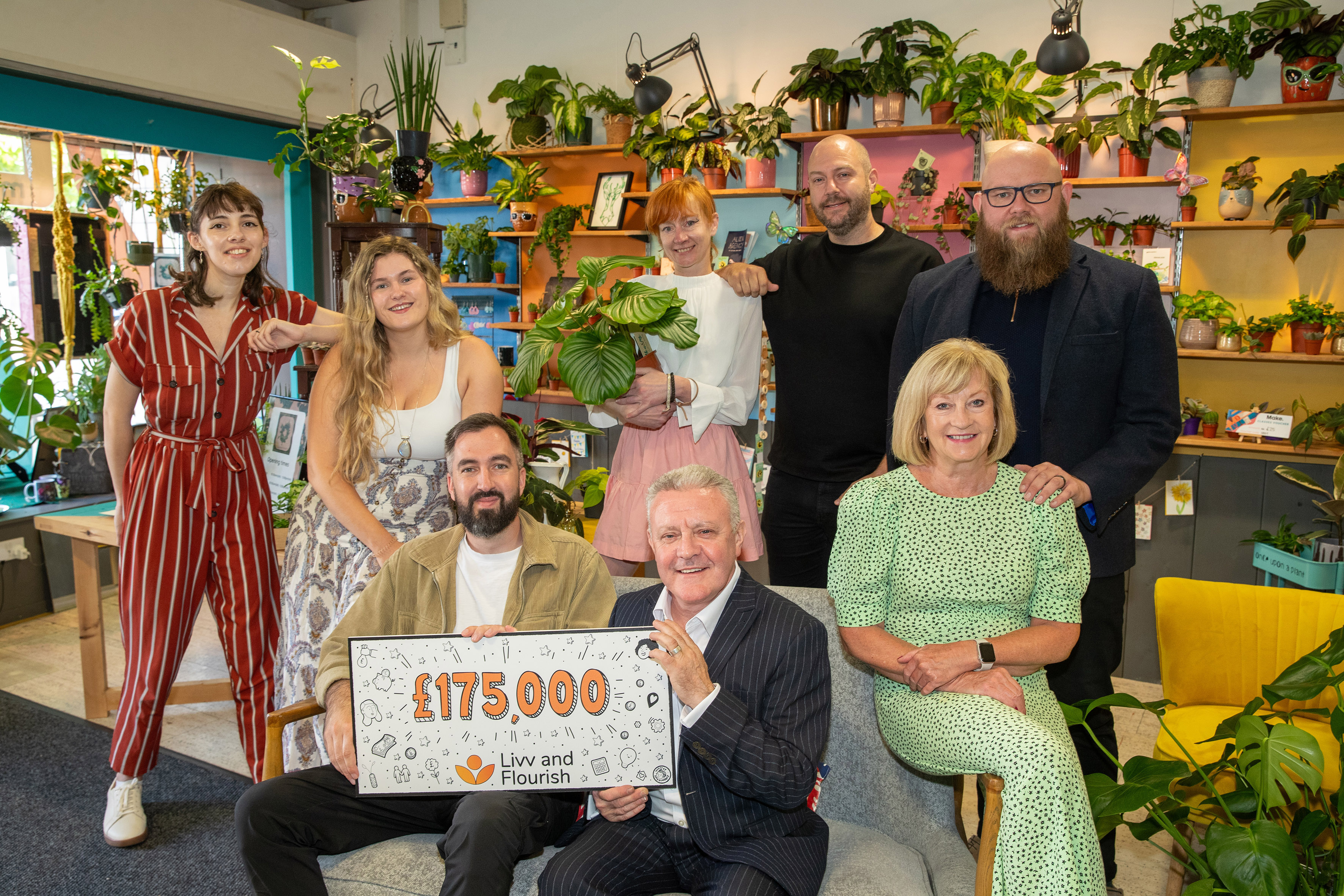Making a home for social enterprise to Livv and Flourish
'Makerspaces' in Liverpool that bring creativity to communities and provide hubs for budding artisans and entrepreneurs to flourish in business have become the first beneficiary of a brand new social investment fund ringfenced for the Liverpool City Region.
Livv Housing Group, a social-impact focussed housing association based in Knowsley, has launched Livv and Flourish, a significant social investment fund with £4.25m of support in the form of blended finance available for social enterprises and charities across the Liverpool City Region over the next three years.
The fund’s first social investment of £175,000 is set to make a meaningful difference to a purpose-driven social enterprise that works across the region. Make, a community interest company set up in 2012, unites and enriches communities through creativity, art and culture at its 'makerspaces', which create places for makers and artisans to turn their passions into prosperity.
Traditional finance options are often not available to organisations like Make CIC, despite the significant societal impact they generate
Making social impact that matters
Make CIC applied to the Livv and Flourish fund to support the development of its new premises in Birkenhead. The social investment Make received from Livv includes a blend of finance, made up of a loan of £150,000 and a grant of £25,000.
Liam Kelly, Make CIC’s CEO, believes that social lending, like Livv and Flourish, is a critical part of making impact work happen in communities. “Traditional finance options are often not available to organisations like Make CIC, despite the significant societal impact they generate.” he says. “So thank you to all those in Livv who have put together this fund to ensure that Make, and organisations like ours, can continue to grow the impact our communities desperately deserve.”
Tony Cahill, Executive Director at Livv Housing Group, comments: “Make’s hubs are places that nurture life-changing social impact, spaces where opportunity meets ambition and true collaboration. They’re spaces for ideas to incubate, for business start-ups to literally start up, to grow and to flourish into established business enterprises that support livelihoods. It’s in recognition of this genuine spirit of social impact that the first investment from our new fund has been made to Make.”
It’s in recognition of this genuine spirit of social impact that the first investment from our new fund has been made to Make
Now the funding is not only helping to ensure the overall sustainability of the organisation – it's also enabling Make's network of makers’ hubs to increase their social impact, by creating opportunities for Make's residents to support their livelihoods.
Working out of Make's Huyton Village location are three such creative entrepreneurs: plant merchant Agnieszka Holubik, sweet entrepreneur Paul Doyle and animator and illustrator Cath Garvey.
Putting down strong roots
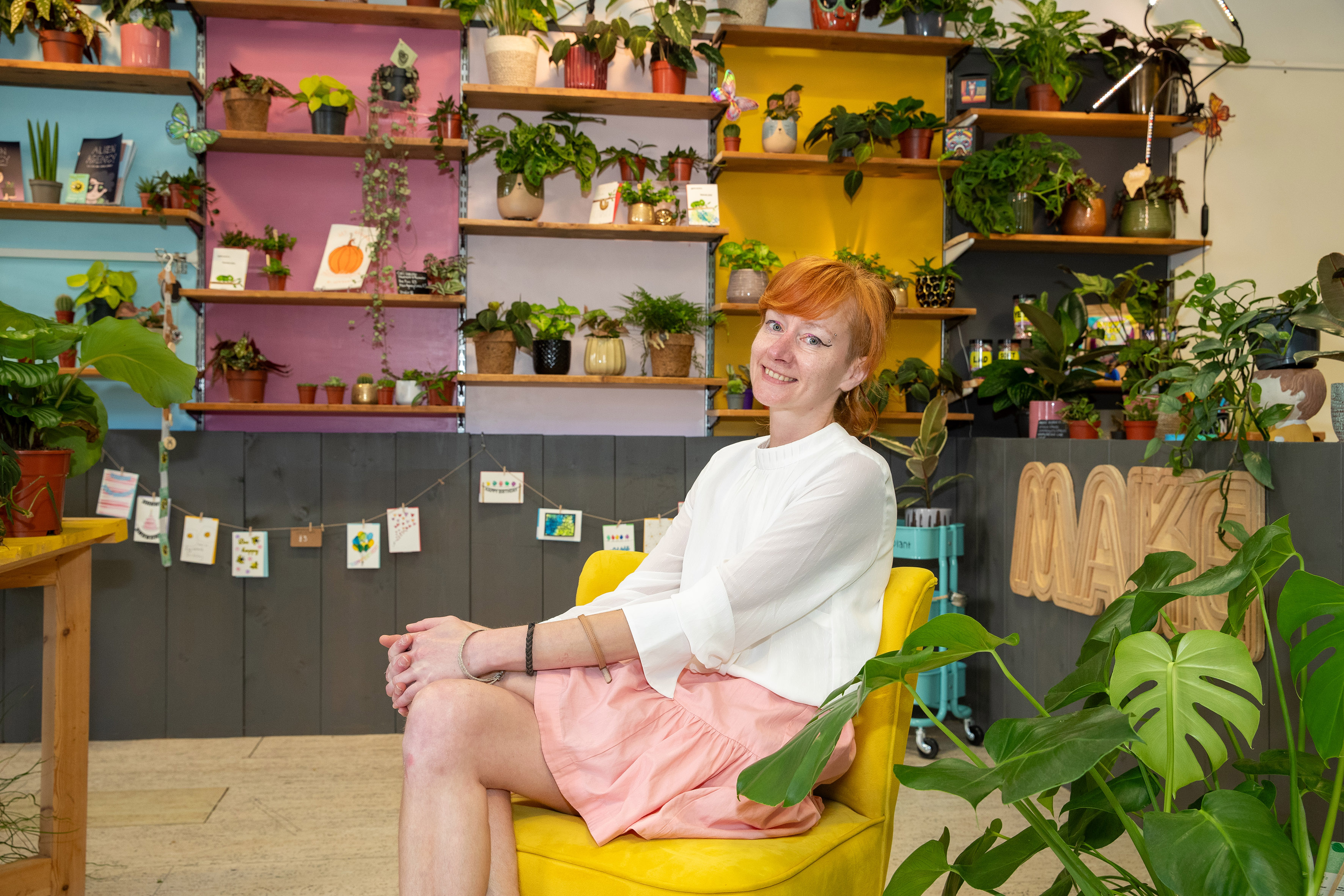 Green-fingered Agnieszka opened Once Upon a Plant in May this year, and says the Huyton Village makerspace is the perfect place for her business to put down strong roots and nourish her ambitions for growth.
Green-fingered Agnieszka opened Once Upon a Plant in May this year, and says the Huyton Village makerspace is the perfect place for her business to put down strong roots and nourish her ambitions for growth.
Establishing her business at Make means she can be part of a building that serves as a cultural hub in the centre of a village, which is about the same size as the place where she grew up in in Poland.
Originally from the small town of Hrubieszów, Agnieszka’s grandparents were farmers growing wheat, corn and sugar beets and her mum has a background in retail with her own shop.
Agnieszka inherited her grandparents’ passion and skillset in growing things alongside her mum’s business acumen, as she dreamed of creating her own business in the heart of the locality she lives in.
Make’s Huyton Village location gave her the perfect environment to realise her entrepreneurial dream, with the longer-term goal to be able to create jobs for more people in Huyton as she hires to support her budding business venture.
Agnieszka’s favourite plant in her shop is the Philodendron, known as the ‘friend plant’ because it lives in harmony with other plant species. She says it is symbolic of the collaborative spirit of her fellow resident makers in Huyton alongside Make’s overarching manifesto, which persuaded her instantly that this was the right place to start up her business with a supportive culture.
Agnieszka says: “Make’s vision to create its network of makerspaces has given my first business its first home. I’m so grateful to the Livv and Flourish fund for recognising the difference this kind of social impact model can make to people’s lives, just like mine.
“It’s a place and space where I can make my business dream come true and work as part of a collaboration of supportive and like-minded fellow residents as part of our business community here. A massive thank you to Livv Housing Group’s new social investment fund for helping Make to create even more social impact and to help change lives through their spaces.”
Agnieszka’s favourite plant in her shop is... known as the ‘friend plant’ because it lives in harmony with other plant species. She says it is symbolic of the collaborative spirit of her fellow resident makers
A sweet place for entrepreneurialism
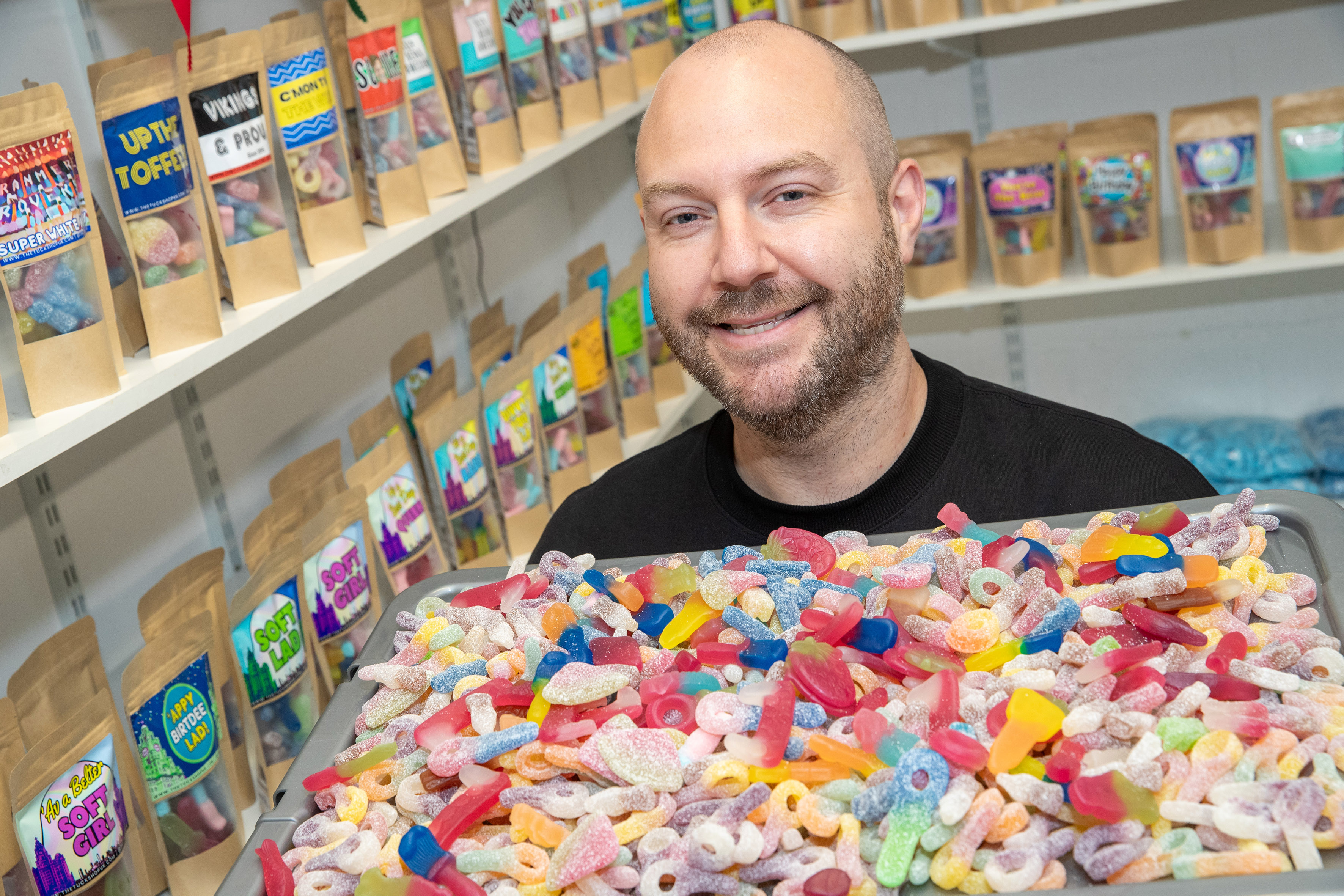 Sweet entrepreneur Paul Doyle had the idea for his business venture during the pandemic, setting up his vegan-friendly personalised sweet pouch ranges in his spare room, after spotting a gap in the market.
Sweet entrepreneur Paul Doyle had the idea for his business venture during the pandemic, setting up his vegan-friendly personalised sweet pouch ranges in his spare room, after spotting a gap in the market.
With a day job in the TV industry, Paul had started to pick up on comments that there were just not enough vegan-friendly sweet choices out there in one place. In response, he wanted to set up an inclusive brand as a business venture that could answer that ‘confectionery call out’.
So Paul started The Tuck Shop UK in lockdown, moving into Make’s Huyton Village location as its first resident a year ago. With a focus on selling his vegan-friendly gummy and jelly sweet ranges at festivals and makers markets across the North West, he now has the shelves and space to house more stock, weigh out and package up his sweet pouches, ready for sale at makers markets, events and special occasions, as well as via his website, ready to ship out to anywhere in the world. Paul can also personalise his sweet pouches with messages to mark special occasions, slogans for football and rugby clubs, and branding and logos for corporate gifting.
Paul says being based at Make Huyton Village really matters, since it’s helping to re-energise the local high street whilst also providing a hub where makers can support each other.
“We're really all cheerleading for each other, we’re all out for each other’s success with our different types of businesses that have a home here,” says Paul. “I’ve gone from being a spare room start-up to a scaled up business operation. It’s been a great journey - with thanks to Livv and Flourish for seeing the value of such makerspaces, the contribution they can make to local high streets and the local economy, while creating places for people to make business ideas take off for real.”
My canvas for business success
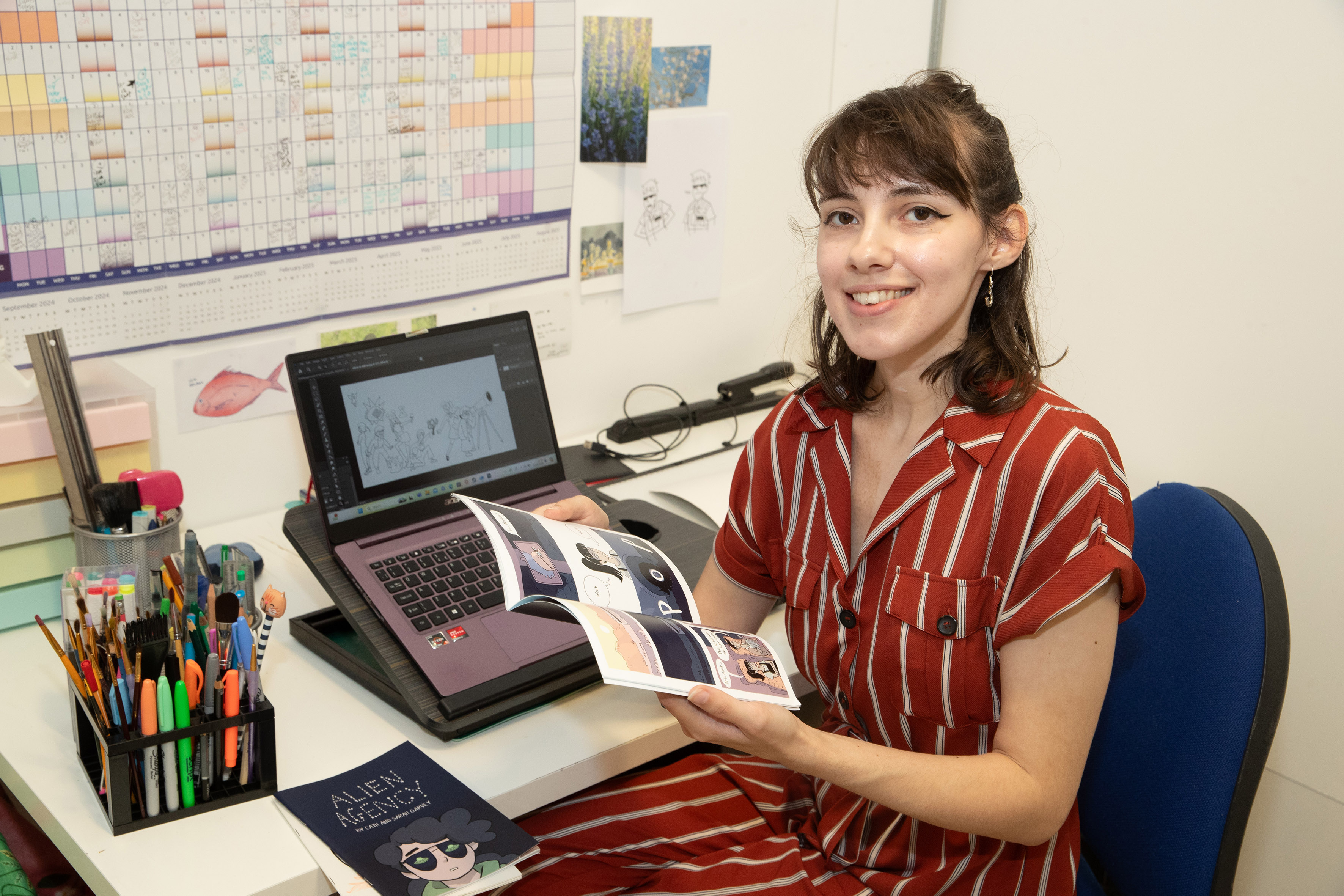 Animator and illustrator Cath Garvey grew up in Huyton and, after graduating with a BA in illustration at Plymouth University and a year working in hospitality, she came back home, with a mind’s eye to find an art studio to work from, ideally right on her doorstep.
Animator and illustrator Cath Garvey grew up in Huyton and, after graduating with a BA in illustration at Plymouth University and a year working in hospitality, she came back home, with a mind’s eye to find an art studio to work from, ideally right on her doorstep.
Cue Make’s Huyton Village location, which is within walking distance of Cath’s home and which she saw as the perfect ‘blank canvas’ from which her business could develop. Cath describes her art as cartoony, colourful and full of character – and her work includes a wide variety of commissions, from medical illustrations to zines about growing fruit and veg on a budget, through to a project to animate archive photography documenting Widnes Market, and a self-published Sci-Fi comic zine created with her sister.
“This is a really down to earth place for working class artists to do what we do best and with a brilliant sense of togetherness and collaboration,” comments Cath. “This investment will help to continue making us what we are here, so we can live and breathe our creative lives, and make our livelihoods from them.”
Cath is also helping to inspire up and coming artists to commercialise their art, as she is set to become a lecturer at St Helens College in Graphic Design and Professional Practice, teaching on the business side of art.
This investment will help to continue making us what we are here, so we can live and breathe our creative lives, and make our livelihoods from them
- Watch Livv's film about the fund, including interviews with the Make entrepreneurs:
Up to £200,000 of blended finance on offer
Livv Housing Group’s new Livv and Flourish fund is offering a blend of grant and unsecured loan finance of up to £200,000 per application, with tailored support offered to recipients throughout the process from its team. It is ringfenced social investment for Knowsley and the Liverpool City Region, with the fund open for three years.
Socially-driven organisations keen on receiving investment through Livv and Flourish can visit www.livvinvestment.com to find out more and express an interest.
Livv Housing Group’s social investment heritage
Livv and Flourish is part-funded by Access – The Foundation for Social Investment, which works to make sure that charities and social enterprises can access the finance they need to sustain or grow their impact. Access provides patient and flexible investment through blended finance and boosts the resilience of charities and social enterprises through enterprise development. It is supported by funds from the Dormant Assets Scheme, which redirects money from forgotten accounts to good causes, and is distributed via Access.
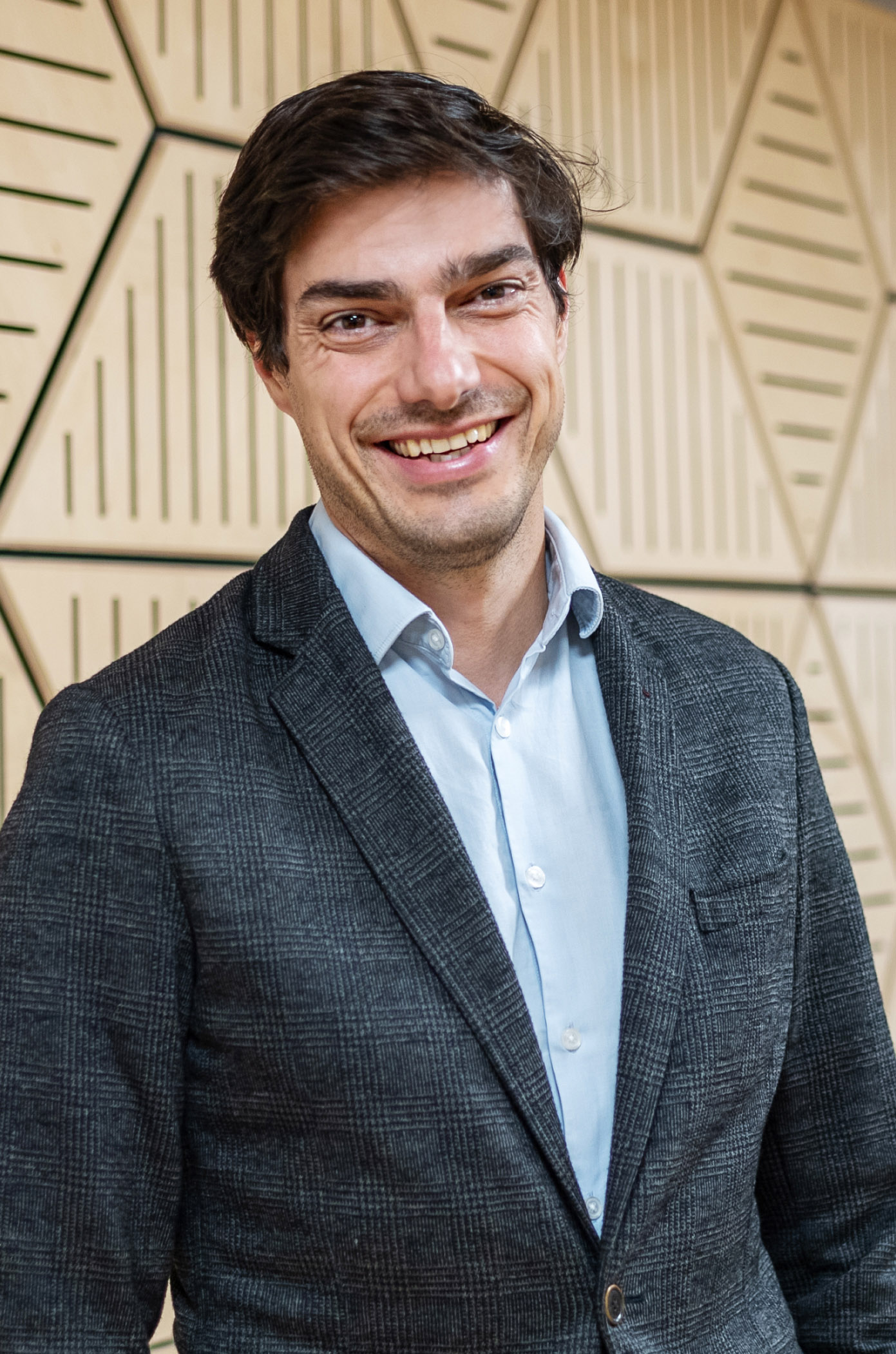 Seb Elsworth, CEO of Access – The Foundation for Social Investment, said: “The Dormant Assets Scheme puts forgotten money to better use, rather than letting it gather dust in inactive accounts. It’s fantastic to see how the scheme is making a real difference in the Liverpool City Region – creating jobs and boosting the local economy by helping social enterprises like Make CIC and the entrepreneurs they support. By combining grants with loans into a blended package, social investors like Livv can offer the kind of small scale, patient and flexible finance that charities and social enterprises need.”
Seb Elsworth, CEO of Access – The Foundation for Social Investment, said: “The Dormant Assets Scheme puts forgotten money to better use, rather than letting it gather dust in inactive accounts. It’s fantastic to see how the scheme is making a real difference in the Liverpool City Region – creating jobs and boosting the local economy by helping social enterprises like Make CIC and the entrepreneurs they support. By combining grants with loans into a blended package, social investors like Livv can offer the kind of small scale, patient and flexible finance that charities and social enterprises need.”
Livv and Flourish is the latest in Livv’s social investment fund portfolio, with over £5.2m of support in loans and grants generating £222m of wellbeing value in the last eight years.
Organisations who received funding previously have used the finance to support thousands of people into employment. Hundreds of jobs were created or sustained, and over 50 new apprenticeships were introduced. Over 29,000 people were supported with training and developed new skills, while 28,000 more were supported with their physical and mental health.
Rally call on new Government to back social investment
Today, there are more than 300,000 social enterprises and charities in the UK, generating £160bn in income and employing more than 3.5 million people, according to data from Social Enterprise UK and the Charity Commission for England and Wales.
Investment can play a key part in funding growth in the social economy, supporting the wider growth that the UK economy so desperately needs. But access to financial investment remains a barrier to their growth, often due to their low profits generated as they focus on social impact and outcomes.
The Independent Commission on Social Investment, established by Lord Victor Adebowale CBE, found that with the right focus on social investment, we could over the next decade create 180,000 jobs, add over £3bn to the UK economy and contribute over £1bn to the Exchequer.
Its final report, Reclaiming the Future - Reforming Social Investment for the Next Decade, found that in the long-term, as these social enterprises generate profit, this could lead to hundreds of millions of pounds being reinvested back into communities.
Since 2000, successive governments have recognised the need and the benefits from investing in the social economy. The Dormant Bank and Building Society Account Act 2008 led to the creation of a social investment wholesaler to assist other bodies to support third sector organisations. The Dormant Assets Scheme has also unlocked £892m for good causes across the UK since 2011, with £485m channelled through Better Society Capital and Access.
Livv's Tony Cahill comments: “At a time of political change it is pivotal that the new Labour Government continues the focus on the impact that social investment can create. Our approach to social investment at Livv recognises the local impact we can have on the communities we serve. By supporting social enterprises and charities in the areas we operate, we can create a thriving social and local economy, giving people the opportunity to thrive, be entrepreneurial, access employment opportunities and improve their skills.”
At a time of political change it is pivotal that the new Labour Government continues the focus on the impact that social investment can create
Make's Liam Kelly concludes: “In times of political change, it's crucial that the new Government prioritises investment in small, local and social businesses. At Make CIC, we have seen first-hand the profound impact that targeted social investment can have on empowering these organisations. The new Labour Government has already started to move in a more positive direction, with initiatives like community right to buy, empowering local organisations to take actions and make positive changes. By working alongside local MPs and ensuring continued support for the grassroots enterprises in our communities, social enterprises, like Make CIC, can help build better, resilient local economies. Social investment is a key part of the support mix that is required to make this happen.”
As well as makers and artisans, Make CIC’s hubs also create a home for different types of individuals, organisations and businesses to thrive. Some of its residents want to be part of a friendly, collaborative environment and have a base so they are not solely working from a desk in their kitchen. That includes people in administration roles, computer based jobs and journalists. Make’s residents also include a number of other Community Interest Companies, charities and businesses ranging from an offshore marine renewable energy technology and research consultancy, a forest school/nature play and wellbeing in nature for adults venture, a Council for Voluntary Service and a book parcel endeavour that raises money for the Motor Neurone Disease Association.
This special feature has been produced in partnership with Livv Housing Group and with the support of Make CIC.
Livv Housing Group is a housing business and more. We provide around 13,000 homes across Liverpool City Region and the North West, plus apprenticeships, training, health and local projects to build flourishing communities. We’re positive, respectful partners who take the lead, do what we say and help others to unlock their potential.
Make CIC is a social enterprise, founded in 2012 by Kirsten Little and Liam Kelly. It supports its residents to turn their passion into prosperity by providing studio space for people who might otherwise be working at home, composed of artists, makers, creatives and small businesses. It runs a programme of workshops, public classes and courses, exhibitions and support, across sites in Birkenhead, Liverpool’s North Docks and Knowsley’s Huyton Village, which are collectively home to over 147 residents.
|
|


